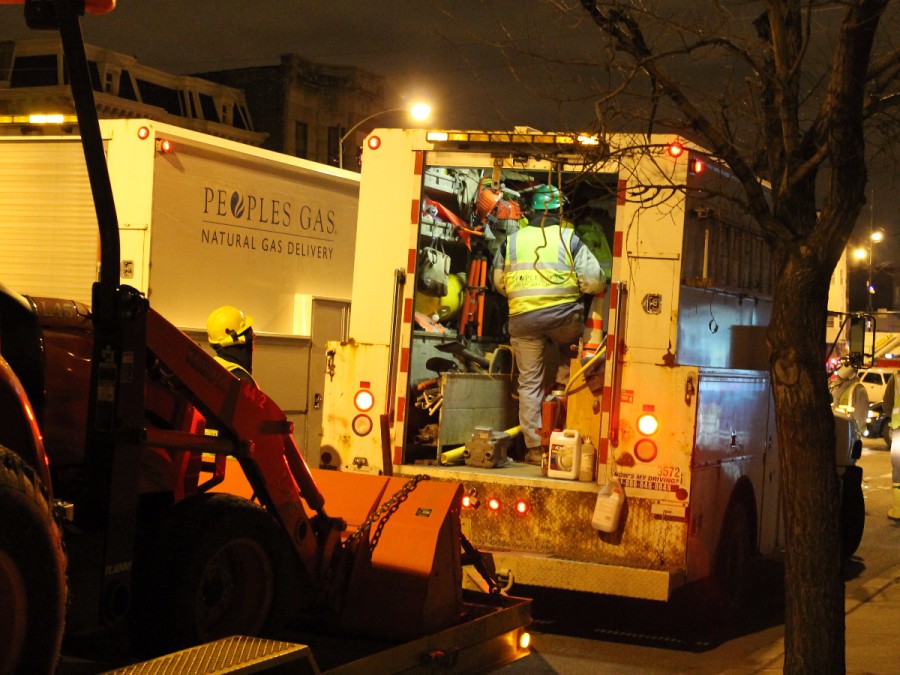A Project That Could Double Heating Bills In Chicago Gets A Closer Look From Regulators
By Dan Weissmann

A Project That Could Double Heating Bills In Chicago Gets A Closer Look From Regulators
By Dan WeissmannChicago residents could see their gas bills skyrocket because of a controversial project from Peoples Gas to replace all its aging gas mains.
On Wednesday, the Illinois Commerce Commission, which regulates utilities across the state, plans to vote on whether to extend its investigation into the $8 billion project, which has more than tripled in cost since its first estimate in 2009.
The commission’s vote could ultimately have profound effects on Chicago ratepayers, who could largely be on the hook for the ballooning costs.
“It’s work that needs to be done, but we have to make sure that it’s done at a reasonable cost,” said David Kolata, executive director of the Citizens Utility Board, a watchdog group.
What’s at stake
The program is on track to double heating bills by 2029, Kolata said, but rates could go up even higher.
“That doesn’t take into account what might happen if natural gas prices increase — which could happen,” Kolata said. “They’re kind of at historically low levels right now.”
Illinois Attorney General Lisa Madigan has said the rates Peoples Gas charges Chicagoans are already among the highest in the Midwest.
And some Chicagoans already find heating bills unaffordable, said Julieta Bolivar, who volunteers at Operation Brotherhood, a West Side agency where people can apply for financial assistance with gas bills. There are more than 70 similar organizations across the city.
Asked what would happen if heating bills doubled, Bolivar made a face and drew a breath. “I don’t know,” she said.
The busy season is in fall, she said. “September, October, November — oh my God.”
There’s a line when the office opens, Bolivar said, and she and her colleagues see maybe 90 people a day.
But not everyone gets the help they need to keep the gas on. State records show that in a recent 12-month period, Peoples Gas actually disconnected more than 77,000 accounts.
The audit
At first, Peoples Gas estimated the project would cost $2.63 billion. By 2012, a year after work had started, the company revised that estimate upward to $4.45 billion.
The Illinois Commerce Commission hired an independent auditor, Liberty Consulting.
Liberty’s report, which came out in May 2015, was scathing. Not only was the program behind schedule and over-budget, it didn’t have any reasonable mechanism for controlling — or even predicting — costs. Executives at Peoples Gas told the auditor that they hadn’t produced a new estimate for three years, the report said.
“The inability even to prepare a credible estimate raises a fundamental concern about the quality of (the program’s) management, control, and oversight,” the report said.
And those dramatic cost increases were picked up by ratepayers. Usually, when utilities undertake big projects, they spend the money, then ask the regulators to approve a rate hike to get themselves paid back.
But state lawmakers gave Peoples Gas permission to tack each year’s costs onto gas bills.
That essentially gave Peoples Gas a blank check, Kolata said.
“Put it this way: They didn’t have an incentive to control costs — they didn’t particularly care — because it was going through automatically on our bills,” he said.
Then, a few months later, in summer 2015, another bombshell dropped: When Peoples Gas told Liberty and the Illinois Commerce Commission that the company didn’t have a revised estimate for the project’s total cost, it turned out they hadn’t been telling the truth.
They actually had a revised estimate — of more than $8 billion, more than triple the original estimate.
Citizens Utility Board pressed for an investigation, along with the state’s attorney general’s office, which represents consumers when utilities ask regulators for rate increases.
Regulators started an investigation, but before it was completed, Peoples Gas reached a settlement with the state in May 2016.
The company paid more than $18 million, but it didn’t admit to doing anything wrong, and executives never had to testify.
Afterwards, the Illinois Commerce Commission opened up new hearings on the project. At those hearings, Madigan’s office made its arguments opposing the project.
“Our concerns are twofold,” Madigan recently told WBEZ. “The program is too expensive, and we don’t need this program to fix leaky pipes.”
Madigan said Peoples Gas already has a mechanism to get reimbursed by ratepayers for replacing leaky, dangerous pipes.
“Is this something that is necessary? Is this something that is cost-effective? The answer has been no and no,” she said.
Last December, a hearing officer with the Illinois Commerce Commission recommended letting the pipeline project go forward. The commission sat on that recommendation until this week.
Why the ballooning costs?
Peoples Gas declined to talk with WBEZ, and staff from the Illinois Commerce Commission said they are forbidden by law from discussing the project.
Severin Borenstein, an economist at University of California at Berkeley who studies utility and energy, offered some perspective.
“This is the absolutely standard problem of regulating utilities,” he said. “It’s very difficult to tell poor effort from bad, random luck.”
There are three big possibilities for why the cost is at least three times what Peoples Gas initially estimated, Borenstein said. Maybe Peoples Gas just gave a lowball estimate, he said, or maybe the company just did let costs get out of control through negligence.
“Or, was it— the third possibility— just a genuine surprise, that— even for the best company, would have been a surprise?” he said.
Based on the record, Borenstein said he thinks there’s probably at least some lowballing or some negligence here.
“But how much of the 200 percent cost overrun can be explained by that, we just don’t know,” he said.
Dan Weissmann is a reporter for WBEZ. You can follow him at @danweissmann.